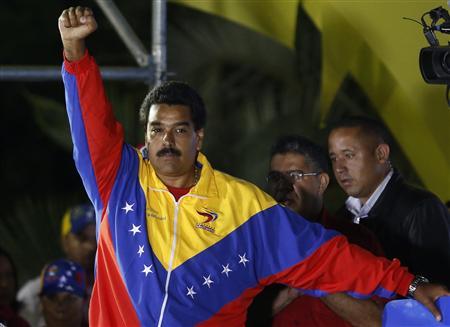
Venezuelans elect a new legislature on Sunday in a vote that may punish the ruling Socialist Party for a prolonged economic crisis and could strengthen the opposition's efforts to challenge the broadly unpopular President Nicolas Maduro.
Polls show frustration over chronic product shortages and runaway inflation, signalling that voters could hand Venezuela's socialists their first loss in parliament since their movement's founder, late president Hugo Chavez, took office in 1999.
Winning a majority of the 167 seats would not give the opposition power to overhaul the struggling state-led economy. But it would shatter the Socialist Party's aura of electoral invincibility and could embolden the opposition to seek a recall of Maduro in 2016.
A nationwide survey in November by respected pollster Datanalisis estimates 55.6 percent of voters would back opposition candidates and only 36.8 percent the government.
No pollster has published surveys carried out in each individual electoral district, which experts say is the only way to fully measure public opinion for this type of vote.
A former bus driver and foreign minister, Maduro, 53, has spent weeks on the campaign trail, appearing at rallies with pro-government candidates to a backdrop of Afro-Caribbean drumming as red-shirted supporters wave flags.
"They say they're winning in the polls – it's the same story of the last 17 years," roared Maduro at one event.
"Let them win in the polls, we will win in the streets."
Datanalisis shows his popularity rose 11 points in late November to reach 32.3 percent, which may be the result of his intense campaigning.
Offsetting opposition optimism, the Socialist Party benefits from a geographic distribution of seats that favors historically pro-government rural areas over cities.
Polls close at 6:00 pm local time (5:30 pm EST) with results expected around 10:00 pm local time.
Size of majority
The practical impact of a potential opposition victory would depend on how large a majority it wins.
Taking two thirds of the seats would allow Maduro's adversaries to sack cabinet ministers as well as name directors of the National Electoral Council, which critics accuse of routinely favoring the ruling party.
With a simple majority, lawmakers could pass an amnesty law to seek the release of jailed politicians such as Leopoldo Lopez, who was arrested for leading 2014 anti-government protests.
They could also open investigations of state agencies, interrogate cabinet ministers and pressure for the publication of economic indicators such as inflation that have been kept under wraps as the economy has unravelled.
Last year's collapse in oil markets has left the OPEC member struggling to pay its bills, while rigid currency and price control systems have spurred product shortages.
Supermarket lines that snake across several blocks are a common sight. Black market re-sellers provide everything from dollars to eggs for those who can afford them.
The election will have no immediate impact on Maduro's term in office, which expires at the start of 2019. The opposition can seek a recall referendum next year by collecting signatures.
And a legislative majority will not give the opposition immediate leverage to overhaul dysfunctional economic policies that economists see as fomenting the crisis.
The vote comes on the heels of a scandal sparked by the arrest in the United States of two nephews of First Lady Cilia Flores on cocaine trafficking charges, renewing focus on the flow of drugs through Venezuela from neighboring Colombia.
"If the opposition gets a majority, they can start their own investigations into high-level officials' involvement in the drug trade," said Mike Vigil, former chief of International Operations for the US Drug Enforcement Administration.
"They can start working in those areas even with Maduro still in power."
